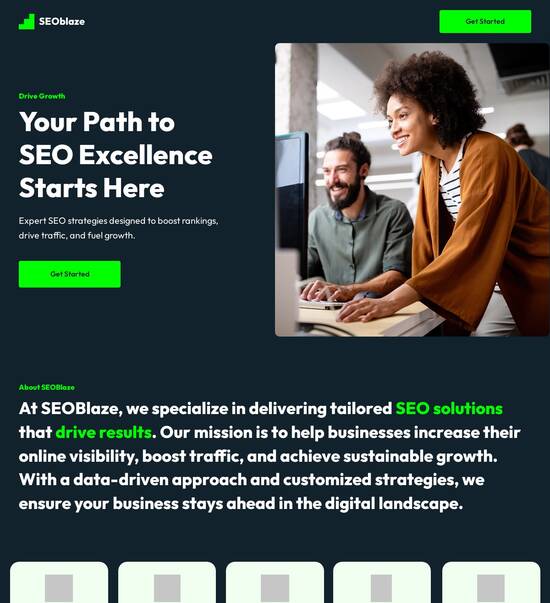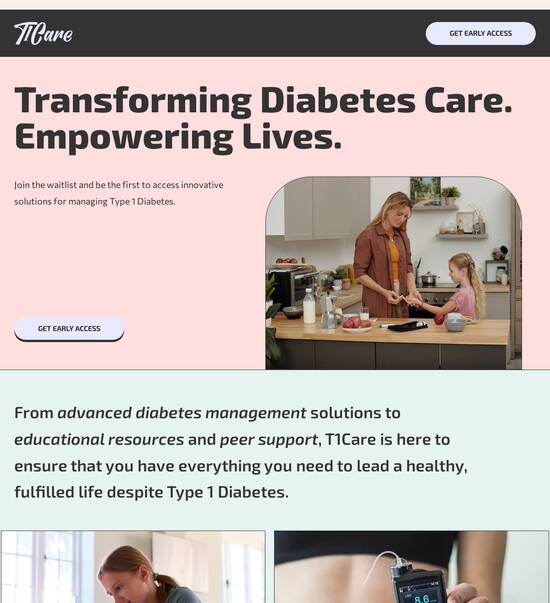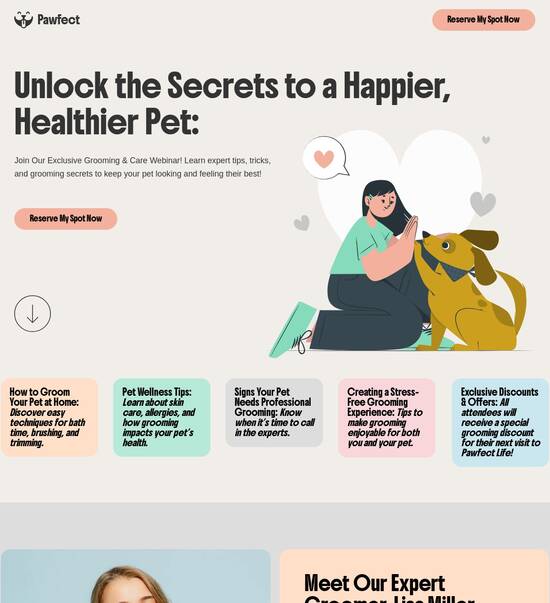
React.js optimized mission and vision page template
Explore Similar TemplatesAbout template
Supercharge your mission and vision page with React.js for outstanding performance! Learn more today.
Recommended templates

Easy to build without coding
With the intuitive drag-and-drop builder, anyone on your team can create high-converting pages without any knowledge of code or design. Make enhancements to your landing page with custom widgets using Javascript, HTML/CSS, or third-party scripts.

Multiple layouts for any industry and goal
Select from 500+ landing page layouts built to boost conversions across industry-specific scenarios. Customize them by adjusting fonts, adding images, and generating on-brand content with the AI assistant. Quickly scale with Instablocks® and Global Blocks that you can save, reuse, and update globally.

Loads fast and looks polished on any device
Every template is responsive, which means they present professionally on any device and load blazingly fast with our Thor Render Engine. You can also power them up with Google AMP technology to deliver an unparalleled mobile experience and drive higher conversions.

Robust analytics & experimentation
Get real-time updates and reporting across all your devices, showing the number of visitors, conversions, cost-per-visitor, and cost-per-lead. Launch AI-powered experiments, run A/B tests, and use heatmaps to analyze user behavior, then optimize your landing page to maximize conversions.







Easy to build without coding
With the intuitive drag-and-drop builder, anyone on your team can create high-converting pages without any knowledge of code or design. Make enhancements to your landing page with custom widgets using Javascript, HTML/CSS, or third-party scripts.
Multiple layouts for any industry and goal
Select from 500+ landing page layouts built to boost conversions across industry-specific scenarios. Customize them by adjusting fonts, adding images, and generating on-brand content with the AI assistant. Quickly scale with Instablocks® and Global Blocks that you can save, reuse, and update globally.
Loads fast and looks polished on any device
Every template is responsive, which means they present professionally on any device and load blazingly fast with our Thor Render Engine.
Robust analytics & experimentation
Get real-time updates and reporting across all your devices, showing the number of visitors, conversions, cost-per-visitor, and cost-per-lead. Launch AI-powered experiments, run A/B tests, and use heatmaps to analyze user behavior, then optimize your landing page to maximize conversions.
All the features you need to build lead-generating landing pages
Explore more featuresLearn how to build top-performing landing pages for any goal
FAQs
Leading the way in building high-performing landing pages





Accelerate your marketing success with Instapage landing page and CRO platform
Optimizing digital marketing campaigns hinges on effective landing pages, and with Instapage, you can harness the most powerful tools available. This guide will explore how the Instapage solution enhances conversion rate optimization (CRO) and skyrocket your return on investment (ROI). From customizable templates to advanced analytics, discover how your marketing strategy can be refined and elevated through this dynamic platform.
Understanding Instapage's flexible landing page creation
Instapage provides a seamless experience for marketers aiming to create high-converting landing pages. The platform features over 100 ready-to-use templates specifically designed to captivate your audience. Whether you're focused on educational content, tech promotions, or financial services, Instapage facilitates unique designs that align with your brand objectives.
- Variety of templates: Choose from a wide array of pre-built templates that cater to different sectors and campaigns, saving time in the page creation process.
- User-friendly interface: With intuitive builders, easily drag-and-drop elements ensure even those with no coding skills can go live quickly.
- Adaptive designs: The ability to modify layouts in real-time allows for scalable marketing efforts across various devices.
Maximizing conversion through optimization tools
Instapage empowers marketers with built-in optimization features that drive conversions through data. Leveraging heatmaps and A/B testing allows you to iterate quickly based on audience behavior.
- A/B testing: Easily test different versions of your landing pages to see which performs better, making informed adjustments based on actual user interaction.
- Heatmaps: Analyze where visitors click most frequently on your pages, providing crucial insights into user engagement.
- Analytics dashboard: Assess the performance of your campaigns with real-time analytics that keep your marketing efforts on track.
Personalization for tailored experiences
Creating outstanding user experiences also entails personalizing content for different segments of your target audience. Instapage’s tools, including dynamic text replacement and AdMaps, help align your messages with the right recipients.
- Dynamic text replacement: Alter on-page text dynamically to match the ad copy, ensuring consistency and relevance for users.
- AdMaps: Connect specific ads to targeted landing pages, driving a cohesive user experience from click to conversion.
- Audience-level metrics: Utilize advanced tracking features to understand engagement and performance metrics tailored to each market segment.
In conclusion, Instapage provides a comprehensive suite of tools for marketers to optimize and enhance conversion rates effectively. By combining powerful templates, optimization techniques, and personalization strategies, you ensure that your marketing campaigns are both efficient and successful.
Take your marketing campaigns to the next level with Instapage today. Start with a free trial and experience firsthand the unique benefits that can enhance your digital marketing strategy and maximize your ROI.
People also ask about React.js optimized mission and vision page template
ReactJS optimized mission and vision page template
Understanding the core purpose of a mission and vision page
A mission and vision page serves as the cornerstone of a brand's identity, clearly articulating who the company is and what it aims to achieve. This page communicates the essence of the brand to employees, stakeholders, and customers alike, making it an essential resource for any organization. A well-crafted mission statement reflects a company's purpose and core values, while a vision statement outlines long-term aspirations and goals.
It's crucial to differentiate between mission and vision statements. The mission statement focuses on the present and the primary objectives of the organization, answering questions about what the company does and for whom. In contrast, the vision statement is future-oriented, projecting the desired ultimate outcome of the company’s endeavors. This distinction helps in crafting targeted communication that aligns efforts across the organization.
Clarity: Clear and concise language that can be easily understood.
Inspiration: A motivating tone that encourages engagement and alignment.
Relevance: Statements that resonate with current industry trends and organizational values.
Navigating the ReactJS framework for optimal performance
ReactJS is a powerful JavaScript library for building user interfaces, particularly suitable for single-page applications where reactivity is essential. One of the significant advantages of using ReactJS is its ability to create dynamic and responsive web applications with less effort and more maintainability. React utilizes a virtual DOM that optimizes rendering by only updating parts of the page that have changed, rather than reloading the entire interface, which significantly enhances performance.
Making the most of ReactJS means understanding its fundamental design principles, such as component-based architecture. This method allows programmers to break down complex interfaces into simple, reusable components, making it easier to manage and develop applications. By leveraging these components effectively, developers can create seamless user experiences that are not only visually appealing but also highly functional.
Essential elements of an optimized mission and vision page template
An effective mission and vision page template should have certain fundamental components that clearly convey the organization's core values. Starting with a well-structured title and header, these should reflect the company’s ethos and make an immediate impact on the visitor. The descriptive sections dedicated to mission and vision statements must be prominent and should follow a consistent formatting style that enhances readability.
Integrating the story of your brand is essential for engaging your audience. Crafting engaging narratives around your mission and vision helps to connect emotionally with users. This can include anecdotes about the organization's founding, its journey, and key milestones. The language should be infused with personality, supported by visual elements that align with the overall narrative, creating a cohesive story that visitors are likely to remember.
Styles and theming options for customization
Aesthetically pleasing designs typically rely on effective CSS techniques. Utilizing CSS variables can simplify styling adjustments, making it easier to maintain visual consistency across different components. Ensuring a responsive design is also crucial, as users will access the page on various devices. This means testing the page layout across different screen sizes before launch.
Another important aspect of design flexibility is theming. Businesses have diverse branding needs, so offering predefined color palettes and typography options can help marketers align the page with their corporate identity. Additionally, leveraging community-contributed styles can inspire unique design choices that stand out while adhering to industry best practices.
Harnessing the component library: building blocks of UI
Utilizing a robust component library can save significant time and resources when building mission and vision pages. Such libraries typically include reusable components that can streamline the development process. Accessibility considerations should be a priority within this design approach, ensuring that all users, including those with disabilities, can navigate and understand the content effortlessly.
Additionally, custom components can represent unique brand aspects, contributing to differentiation in the market. Developers can create unique icons or animations that reflect the brand's personality or mission. Strategies for seamlessly integrating multimedia elements, like videos and images, can greatly enhance user engagement and offer a richer user experience.
Advanced implementations for custom functionality
Employing advanced features of ReactJS can add significant interactivity to mission and vision pages. Effective state management using hooks or the context API facilitates a smoother user experience, allowing elements on the page to respond to user behavior in real-time. Integrating animations can further enhance engagement by providing visual feedback that captures user attention.
Furthermore, dynamic content loading can improve the performance of these pages, keeping load times low. Implementing feedback mechanisms, like polls or other opportunities for user engagement, can also provide valuable insights into visitor preferences and satisfaction. This approach not only fosters a connection with users but also equips the organization with data to refine future content strategies.
Responsive design strategies for all screen sizes
To ensure readability and accessibility across various devices, adopting a mobile-first approach during the design and implementation phases is advisable. Starting with mobile design as a baseline and scaling up to bigger screens promotes a user-friendly experience regardless of device. Testing methodologies for responsiveness should be part of the development lifecycle, allowing for adjustments before the official launch.
Implementing breakpoints effectively using CSS Media Queries is crucial for achieving responsive design. This technique allows developers to adjust the layout and features of the page depending on the user's screen size, making necessary modifications to enhance usability on both large-scale displays and smaller mobile devices.
Practical applications for diverse user groups
When crafting mission and vision pages, it's essential to tailor content for specific audiences. The approach for businesses may differ significantly from that of non-profits, so understanding these nuances is crucial. Adapting content to suit various demographic profiles can establish a more profound connection and ensure messages resonate effectively.
Case studies showcasing successful mission and vision pages across different sectors can provide insight into effective strategies. Examining examples in industries such as technology, education, or financial services reveals commonalities in structure, messaging, and user engagement techniques that organizations can apply to their web presence.
Best practices for maintaining consistency and branding
Consistency is critical for building a cohesive brand narrative across all webpages. Establishing techniques for aligning messaging and visuals with the overall business objectives can significantly impact brand perception. Regularly reviewing and updating content ensures it remains relevant and resonates with current market trends.
Additionally, utilizing user feedback can lead to content refinement. Encouraging users to share their thoughts and experiences regarding the mission and vision page can provide actionable insights. This feedback loop contributes to evolving the content and ensures that the narrative remains aligned with user expectations.
Troubleshooting common issues: ensuring an optimized experience
Addressing common pitfalls in mission and vision pages can significantly enhance their effectiveness. Ensuring fast loading times is essential; utilizing performance optimization techniques, such as code splitting and lazy loading, helps reduce the initial loading burden. Additionally, paying attention to user accessibility concerns is vital for creating an inclusive web experience.
Strategies for continuous improvement based on analytics and user interaction can lead to ongoing enhancements. Monitoring key indicators, such as bounce rates and time spent on page, helps identify areas needing attention. Responsiveness to user feedback can further inform adjustments, making the page more user-centric over time.
Future trends in mission and vision page design
Keeping an eye on emerging trends in web design can help organizations refine and innovate their mission and vision pages. As user expectations evolve, incorporating new technologies, such as extended reality (XR) and advanced AI, can enhance engagement through interactive experiences. Building in adaptability to new formats will become increasingly crucial.
ReactJS will continue to advance, and anticipating potential features can prepare businesses for future developments. These advancements undoubtedly impact how mission and vision statements are presented. Investing time in adapting to these trends will help brands stay ahead of the competition.
Ready to skyrocket conversions?
Supercharge your ad campaigns with high-performing landing pages
Get started














